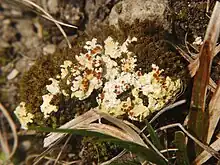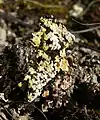| Fulgensia | |
|---|---|
 | |
| Fulgensia fulgens | |
| Scientific classification | |
| Domain: | Eukaryota |
| Kingdom: | Fungi |
| Division: | Ascomycota |
| Class: | Lecanoromycetes |
| Order: | Teloschistales |
| Family: | Teloschistaceae |
| Genus: | Fulgensia A. Massal. & De Not. |
| Type species | |
| Fulgensia vulgaris A. Massal. & De Not. | |
Fulgensia is a genus of lichenized fungi in the family Teloschistaceae.[1] Fulgensia fulgens is often known as ''scrambled egg lichen''. Fulgensia fulgens is a scaly lichen consisting of overlapping, lemon-yellow scales with a lobed edge. The center of the thallus is usually paler with scattered, rounded, dark orange fruits up to 1.5 mm in diameter. When potassium hydroxide is applied the thallus has a purple reaction due to the presence of the lichen substance Physcion.
Fulgensia is a terriculous lichen that prefers calcareous substrates that include chalk, limestone and shell sand. Fulgensia usually grows directly on the acrocarpic moss Trichostomum crispulum, but it can also grow on the ground or on rocks. Fulgensia belongs to a group of specialized lichens that require open habitats with small areas of bare soil and very little competition from vascular plants.
Fulgensia has always been rare in Britain and there are currently six known sites of Fulgensia in England, and a few in south-west Wales.[2]
Gallery
 Fulgensia fulgens, above (yellow) Psora decipiens, below (red), Tauberland, Germany
Fulgensia fulgens, above (yellow) Psora decipiens, below (red), Tauberland, Germany Fulgensia fulgens, Tauberland, Germany
Fulgensia fulgens, Tauberland, Germany
References
- ↑ Lumbsch TH, Huhndorf SM. (December 2007). "Outline of Ascomycota – 2007". Myconet. Chicago, USA: The Field Museum, Department of Botany. 13: 1–58. Archived from the original on 2009-03-18.
- ↑ "Fulgensia fulgens | Lichens of Wales". wales-lichens.org.uk. Retrieved 2023-07-26.
External links